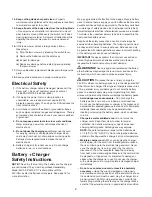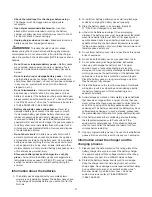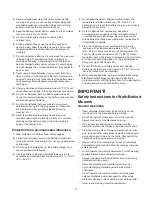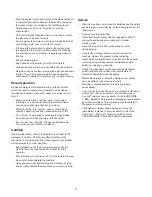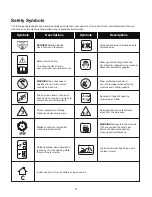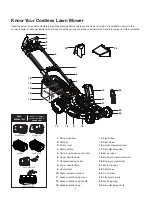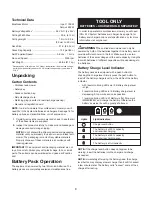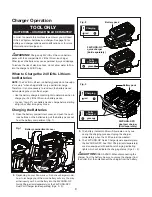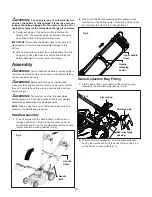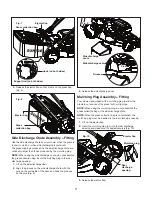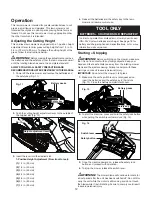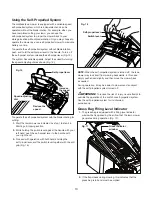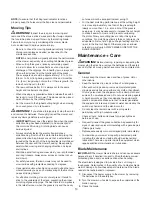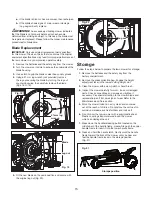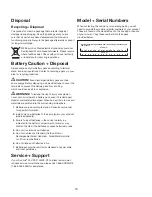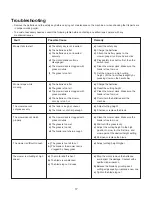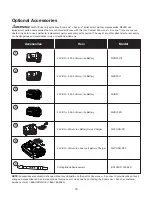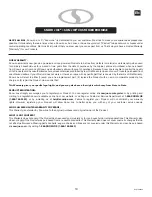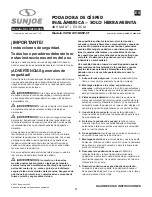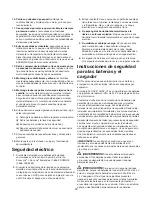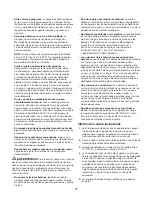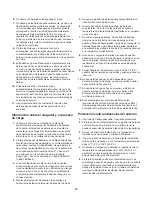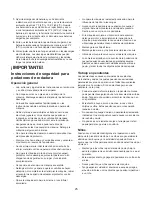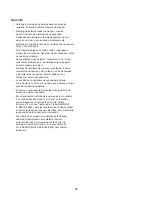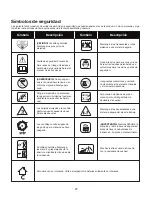
14
NOTE:
To ensure that the filling level indicator functions
properly, keep the holes under the flap clean and permeable.
Mowing Tips
m
WARNING!
Inspect the area prior to mowing and
remove all the stones, sticks, wires and other foreign objects
that could be picked up and thrown by the rotating blade.
Failure to comply not only will damage the mower blade,
but can also lead to serious personal injury.
• Be sure to check the mowing blade periodically for signs
of wear and replace as needed, as described in the
maintenance section.
NOTE: A sharp blade will greatly enhance the performance
of the mower, especially when cutting tall blades of grass.
• When cutting thick grass, reduce your walking speed
in order to allow for a more effective cut and a proper
discharge of the clippings. For a healthy lawn, always cut
off one-third or less from the total length of the grass.
The average lawn should be approximately 1.5 in. to 2 in.
(3.8 cm to 5 cm) long during cool months, and more than
2 in. (5 cm) long during hot months. If there is growth, the
lawn should be cut in the fall.
• The lawn will look better if it is always cut to the same
height and in alternate directions.
• When crossing any gravelled surfaces, release the switch
bar lever to turn off the mower. The stones can be picked
up and thrown by the rotating blade.
• Set the mower to the highest cutting height when mowing
on uneven ground or in tall weeds.
m
WARNING!
If you strike a foreign object, stop the motor
and remove the batteries. Thoroughly inspect the mower and
repair any damage before resuming work.
•
IMPORTANT!
Never open the ejector flap when the grass
collection bag has been detached (to be emptied) and
the motor is still running. A rotating blade can cause
serious injuries!
• Always carefully fasten the ejector flap and grass
collection bag. Switch off the motor before emptying the
grass collection bag. Always ensure that a safe distance
(provided by the length of the long handles) is maintained
between the user and the mower housing. Be especially
careful when mowing and changing direction on slopes
and inclines.
• Maintain a solid footing and wear sturdy, non-slip footwear
and long trousers. Always mow across an incline (not up
and down).
• For safety reasons, the lawn mower may not be used to
mow inclines with gradients exceeding 15 degrees.
• Use special caution when backing up and pulling the lawn
mower towards you as such maneuvering of the machine
poses a tripping hazard.
• For effective mulching, do not cut wet grass; it tends to
stick to the underside of the deck, preventing the proper
mulching of grass clippings. The best time to mow grass is
in the late afternoon, when the grass is dry and the newly
cut area will not be exposed to direct sunlight.
• For the best mulching performance, set the cutting height
to remove approximately one third of the grass length,
ideally no more than 1.5 in. at one time. If the grass is
overgrown, it may be necessary to increase the cut height
to make it easier to mow and to prevent overloading
the motor. Slow your cutting pace in tall or thick grass
conditions. For mulching extremely thick or tall grass, it is
advisable to first cut at a high cut-height setting, and then
re-cut to the final cut height. Otherwise, make narrower
cuts and mow slowly. ALWAYS MAKE SURE THAT THE
BLADE IS SHARP
Maint Care
m
WARNING!
Before cleaning, repairing or inspecting the
mower, stop the machine, remove the batteries and the safety
key. Verify that all moving parts have come to a complete stop.
General
• Always keep the mower clean and free of grass, dirt or
other debris.
• Keep the handles dry, clean and free of oil and grease.
• After each cutting session, remove accumulated grass
clippings and debris using either a dry cloth or handbrush.
You may also clean the equipment with a damp cloth and
some soft, non-abrasive soap. Do not use cleaning agents
or harsh solvents as they may damage the equipment's
plastic components. Make sure that no water penetrates
the equipment's interior as intake of water can destroy the
switch mechanism and the electric motor.
• Do not clean the lawn mower with running water,
particularly with high-pressure water.
• Check all nuts, bolts and screws for proper tightness
before each use.
• Frequently inspect the grass collection bag assembly for
signs of wear and replace immediately with a genuine part
if damage is found.
• Replace excessively worn or damaged parts immediately.
• To maximize your mower's longevity, all screwed parts,
including the wheels and axles, should be cleaned and
lubricated. There are no parts inside the equipment which
require additional maintenance or lubrication.
Blade Maintenance
IMPORTANT:
The mower blade is sharp and can cause severe
personal injury if handled incorrectly. Wrap the blade or wear
protective gloves, and use extra caution when handling.
The steel blade is designed to provide a fine cut in long or
tough grass. Deterioration in the quality of cut indicates blade
wear or damage. Follow these steps to determine if the blade
needs to be resharpened or replaced:
1. Disconnect the power supply to the mower by removing
the batteries and the safety key.
2.
Turn the mower on its side to expose the underside of the
blade housing.
3. Check the blade.


